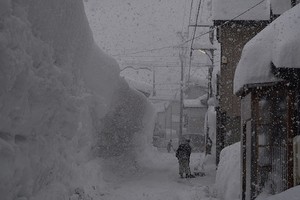Vox Populi, Vox Dei is a daily column that runs on Page 1 of The Asahi Shimbun.
January 11, 2023 at 12:28 JST
 Vytautas Landsbergis, center, chairman of the Supreme Council of Lithuania, speaks during a celebratory gathering for the country’s independence in Vilnius on Sept. 8, 1991. (Asahi Shimbun file photo)
Vytautas Landsbergis, center, chairman of the Supreme Council of Lithuania, speaks during a celebratory gathering for the country’s independence in Vilnius on Sept. 8, 1991. (Asahi Shimbun file photo)
What is a nation and for what does it exist?
“The system that is called a nation is meant to expand its territory and render it immovable,” Vytautas Landsbergis, a 90-year-old Lithuanian politician who headed his country’s independence movement, said in response to these questions, which must have asked by many people before him.
In Tokyo’s Shibuya district, I just watched “Mr. Landsbergis,” a 2021 documentary film about Lithuania from the late 1980s to 1991, when it became independent from the Soviet Union.
On Jan. 11 exactly 32 years ago, Soviet forces occupied the capital city of Vilnius to deny Lithuania’s independence. The film depicts tanks rumbling through the city while gun shots rang out. My eyes were glued to those tense scenes.
Landsbergis was a pianist and a professor at the Lithuanian Conservatory of Music (now the Lithuanian Academy of Music and Theatre) before he became the leader of a political organization for Lithuania’s independence.
He was holed up in the Supreme Council of Lithuania building during the Soviet siege, and he heard tens of thousands of citizens sing folk songs outside.
“That was supreme music,” he recalled. His view of nationhood must have become crystallized at that moment.
Superpowers think nothing of causing bloodshed to preserve their territories. On the other hand, there is incredible intensity in the “eruption of the desire for freedom” in the people who fight against the superpower mentality.
I am reminded of the ongoing reality of the invasion of Ukraine.
After watching this lengthy film, with a running time of over four hours, I remained deeply impressed with the calm confidence with which the leaders of the Lithuanian independence movement explained their ideals of democracy and peace to the public.
Instead of resorting to rousing rhetoric, they continued speaking quietly and simply.
Popular Japanese entertainer Tamori recently caused a stir by coining the expression “atarashii senzen,” which literally translates as “a new prewar period.”
Precisely because of the growing worries in society today about Japan becoming involved in a military conflict, I am thinking all the more about the need for politicians who have the gravitas to ask the public to remain calm.
--The Asahi Shimbun, Jan. 11
* * *
Vox Populi, Vox Dei is a popular daily column that takes up a wide range of topics, including culture, arts and social trends and developments. Written by veteran Asahi Shimbun writers, the column provides useful perspectives on and insights into contemporary Japan and its culture.




















A peek through the music industry’s curtain at the producers who harnessed social media to help their idols go global.
A series based on diplomatic documents declassified by Japan’s Foreign Ministry
Here is a collection of first-hand accounts by “hibakusha” atomic bomb survivors.
Cooking experts, chefs and others involved in the field of food introduce their special recipes intertwined with their paths in life.
A series about Japanese-Americans and their memories of World War II